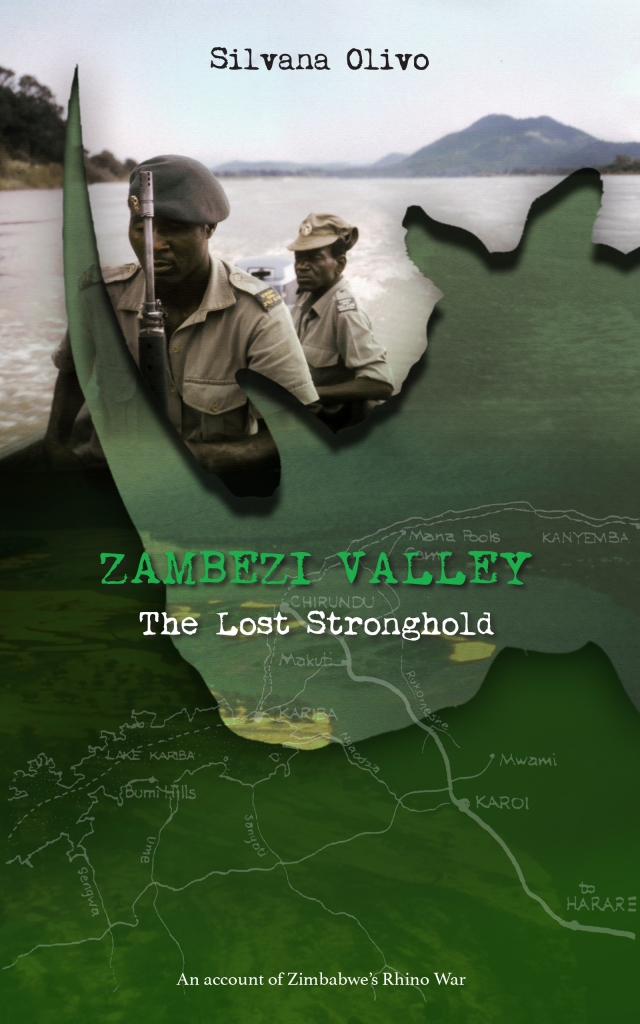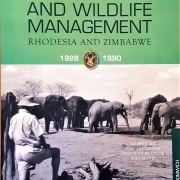This is an important book.
Operation Stronghold. Initiated in 1984 to protect the endangered black rhinoceroses of the Zambezi Valley against cross-border poaching incursions by Zambian gangs in the employ of powerful cartels in Lusaka, it was a desperate attempt to safeguard a vanishing piece of Zimbabwe’s natural history heritage, and one ultimately doomed to failure.
Zimbabwe at one time had the world’s largest population of black rhinos – around 2,400 – but as the poachers decimated the animals’ numbers in the Luangwa Valley, they moved south, across the Zambezi, into Zimbabwe to carry on the carnage. In 1984, President Robert Mugabe authorised a shoot-on-sight protocol to give game rangers a fighting chance in what had already become known as the Rhino War – one of many to be fought in Africa. Paramilitary National Parks units, working side by side with elements of the police, army and air force attempted to stem the tide, while undercover operations by National Parks Investigations Branch were targeted at the traffickers and cartels, but it was becoming apparent that this was already a no-win situation.
Between the years 1980 and 1993, 1,134 rhinos were poached in Zimbabwe, and only 337 horns were recovered. 169 armed poachers were killed in firefights with the security forces and a further 91 were wounded. 4 National Parks personnel were killed in action, and 5 wounded. In the end, it became necessary to translocate as many black rhino as possible out of the Zambezi Valley.
Zambezi Valley: The Lost Stronghold is the story of a handful of dedicated rangers who fought against all odds to protect the last bastion of the greatest concentration of wild black rhinos on earth. Operation Stronghold took place against a broader backdrop of great transition in southern Africa, with China’s influence on the ascendancy, and a more localised setting of corrupt politics and increasing instability in Zimbabwe.
The story has never been told in its entirety. Until now. Silvana Olivo’s Zambezi Valley: The Lost Stronghold is distinguished by two main features: Firstly, it is not just an account of a groundbreaking, last-ditch effort to save an endangered species in its natural habitat, it is a personal memoir, much of which is taken from the author’s diaries and all of which is taken from the author’s firsthand experiences. And secondly, it is extremely well-written. Silvana Olivo is a very good writer, with a clear and concise style that puts the reader in the Zambezi Valley and along the corridors of power in Harare as the story unfolds.
The Rhino War in the Zambezi Valley was fought
by men who risked their lives for very little in exchange, and was dynamically led
by National Parks Chief Warden, Operations, Glenn Tatham, whose idea Operation
Stronghold had been.
Noted conservationist, author and artist Clive Walker – founder of Lapalala Wilderness rhino sanctuary, the Endangered Wildlife Trust and the Elephant and Rhino Foundation – has written the foreword to this book, which is the result of Silvana Olivo’s personal involvement in Operation Stronghold almost thirty years ago. At 21, she became the official Italian representative for half of the decade-long Operation Stronghold.
Silvana’s story unfolds through the direct
reporting of her experiences in the African bush, including the aftermath of firefights
with poachers, and the subsequent translocation and dehorning of rhinos. She
documents the crisis on various levels, from National Parks field stations to
Head Office rhino management decisions and policies.
The task of safeguarding Zimbabwe’s last wild
rhinos was made harder by severe economic and political constraints, and also
by adverse international public opinion due to the country’s shoot-on-sight
policies and the controversial sustainable use model for management of
elephants.
Robert Mugabe once said of the rhinoceros “they
are fellow creatures, with a right of their own to survive in spite of man’s
expanding numbers and greed”, but as Mugabe became a full-on dictator and the
country’s economy collapsed in on itself, National Parks was negatively
impacted by politics to the point where practical rhinoceros conservation became
possible only in vast, private conservancies and smaller, heavily guarded state
parks.
People in First World countries often fail to
appreciate the complexities of conservation in Africa, and this book is a very
well-written look back in time, to a crossroads for the black rhinoceros where
it effectively disappeared from much of its wild habitat. The decisions made
during the years of Operation Stronghold have a direct bearing on the animal’s
present-day struggle for survival. With at least one private initiative having
recently announced its intention to reintroduce the black rhinoceros into the
Lower Zambezi Valley in a year’s time, there are valuable lessons to be learned
from the past.
Silvana Olivo is an Italian-South African writer who has been deeply involved in southern African conservation initiatives since 1989. Her first book, published in 2001, was Kalahari, and she has also written numerous guidebooks to southern Africa’s wild places.
Illustrated by over 30 colour photographs augmented by relevant maps and charts, Zambezi Valley: The Lost Stronghold is currently available from Amazon in hard copy and on Kindle. The hard copy version is available in black and white for $19.00, and the full-colour version for $47.00. for 380 pages of page-turning history.
These 380 pages are a must for any good Africana library.






Leave a Reply
Want to join the discussion?Feel free to contribute!